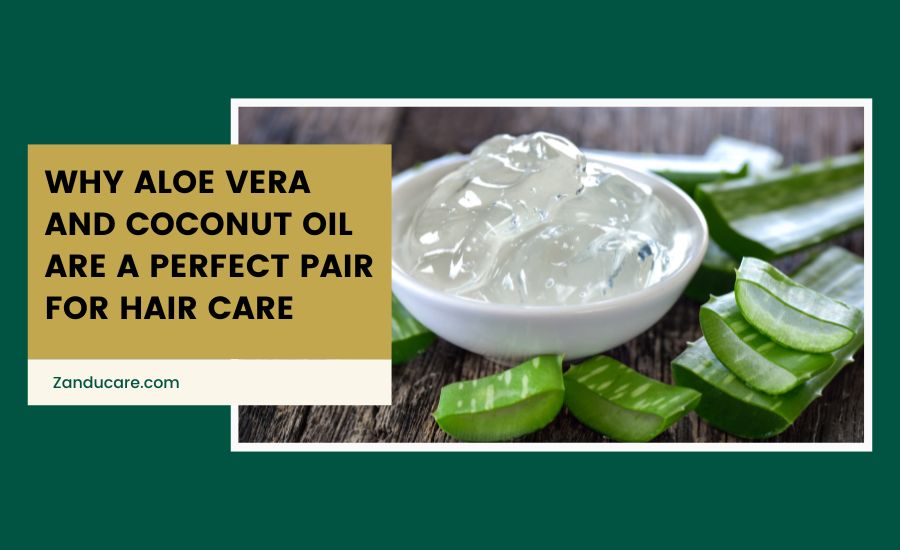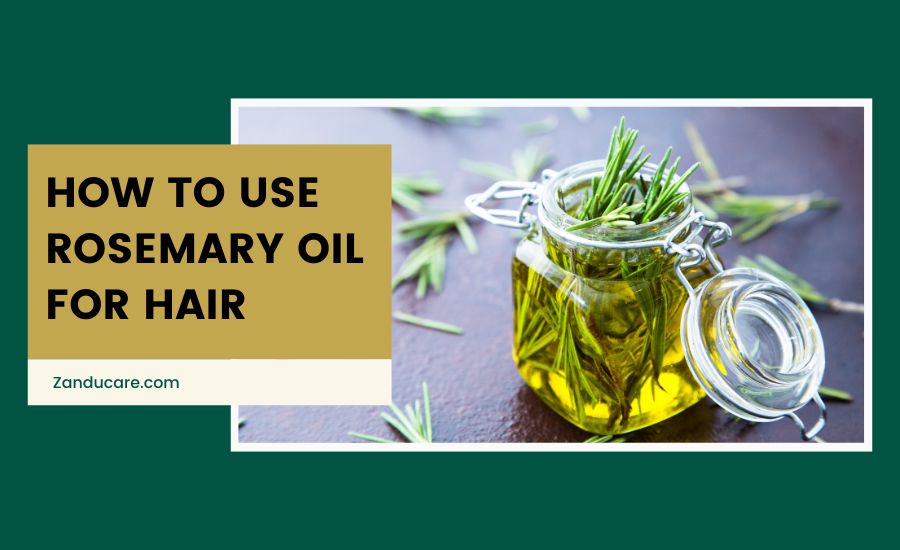
Why Aloe Vera and Coconut Oil Are a Perfect Pair for Hair Care
|
Key insights
|
Among the most widely used natural components in hair care products are aloe vera and coconut oil. Well-known for their healing and moisturising qualities, they can be used separately or in combination to treat various hair issues. Aloe vera and coconut oil may do wonders for your hair, from moisturising parched strands to encouraging hair growth. This article examines the many advantages of utilising coconut oil and aloe vera and successful applications and do-it-yourself recipes suitable for various hair types.
|
Did You Know?
|
Benefits of Aloe Vera and Coconut Oil for Hair

Aloe vera and coconut oil are natural ingredients that benefit hair health and beauty. Combining them can provide deep hydration, strengthen strands, and promote faster hair growth.
1. Hydration and Moisture
Aloe vera is primarily water and contains over 75 nutrients, including vitamins, minerals, enzymes, sugars, and more. Its exceptional hydrating and moisturising properties help hair retain moisture.
Coconut oil penetrates the hair shaft due to its low molecular weight and high lauric acid content. This provides lasting hydration and smoothness from within the strands.
Aloe vera and coconut oil seal in moisture in a lightweight, non-greasy way for maximised hydration.
2. Promotes Hair Growth

Aloe vera contains proteolytic enzymes, like bradykinesia, which help remove dead skin cells and stimulate new cell growth. This helps clear blockages around hair follicles and encourage new growth.
The nutrients in aloe vera also stimulate circulation in the scalp, bringing more blood flow to the follicles to promote growth.
Due to its low molecular weight, coconut oil can penetrate inside the follicles. This provides nourishment to strengthen the roots while clearing buildup to maintain growth.
3. Reduces Dandruff and Itchy Scalp
Aloe vera has powerful antifungal, antibacterial and anti-inflammatory properties that help treat infections and scalp issues caused by Malassezia fungus. This helps reduce dandruff and itchiness.
Coconut oil also moisturises and soothes the scalp to prevent dryness and irritation, which can cause dandruff and itching. Its lauric acid content gives it antimicrobial abilities as well. Combining the two provides enhanced scalp health and relief from dandruff and itching.
4. Strengthens and Repairs Damaged Hair
Aloe vera contains enzymes like protease and amylase, which help rebuild damaged keratin fibres in each hair strand. This helps strengthen hair and prevent breakage. The vitamins and minerals in aloe also help repair damage caused by chemical treatments, heat styling, UV exposure, and other factors.
Coconut oil penetrates the cortex of hair to reinforce it from within. Its fatty acids help reconstruct the protein structure of each strand.
5. Protects Against Split Ends

The emollient effects of coconut oil help smooth down the cuticle scales on hair to prevent snagging and breakage, which can cause split ends. Aloe seals in moisture and creates a protective layer to shield the ends of hair from environmental damage. Using the two together provides lasting protection against split ends by keeping the ends supple and sealed.
6. Shiny and Silky Long Hair
Aloe vera and coconut oil help prevent protein breakdown and loss in hair. In addition to helping to repair damaged hair, they also provide hair with strength, lustre, and a natural silkiness that reduces frizz and dryness.
7. Natural Hair Styling Gel and Serum
Rich in vitamins and minerals, aloe vera nourishes hair and functions as a natural serum. Additionally, it is used as a styling gel, particularly for frizzy and dry hair.
Any hair type, including dry, frizzy, curly, and greasy, can benefit from applying coconut oil and aloe vera. You now understand the benefits of aloe vera and coconut oil for your hair. Let's examine how aloe vera and coconut oil can be used for hair.
How to Use Aloe Vera and Coconut Oil for Hair?
If you want to make the most of these two ingredients, there are several effective ways to apply them. Here’s how to incorporate aloe vera and coconut oil into your hair care routine.
1. Aloe Vera and Coconut Oil Hair Mask Recipe
Mix equal parts of aloe vera gel and coconut oil in a bowl. Apply the mixture to your scalp and hair, focusing on the roots and ends. Leave it on for 30 minutes, then wash it with a mild shampoo.
2. Scalp Massage with Aloe Vera and Coconut Oil
For a relaxing scalp massage, warm coconut oil and mix in a few tablespoons of aloe vera gel. Massage this mixture into your scalp for 10-15 minutes to stimulate blood circulation and promote hair growth.
3. Leave-In Treatment for Deep Conditioning
Apply a small aloe vera and coconut oil mixture to your hair for an overnight deep conditioning treatment. Focus on the ends, and leave it in overnight. Wash it out in the morning for soft, silky hair.
DIY Aloe Vera and Coconut Oil Hair Recipes
Here are some easy homemade recipes to try:
Aloe Vera Gel and Coconut Oil Hair Mask
Mix together:
- 1/4 cup aloe vera gel
- 2 tbsp coconut oil
- 2 tbsp honey
Apply to clean, damp hair. Leave for 20-30 minutes, then rinse.
Aloe Vera and Coconut Oil with Essential Oils
Combine in a bowl:
- 1/4 cup aloe vera gel
- 1 tbsp coconut oil
- 5 drops rosemary oil
- 3 drops peppermint oil
Massage into scalp and hair. Leave for 1 hour before washing out.
Aloe Vera and Coconut Oil for Oily Hair
Whisk together:
- 1/4 cup aloe vera gel
- 1 tbsp coconut oil
- 1 tsp apple cider vinegar
Apply sparingly to the scalp and ends only. Leave for 20 minutes, then rinse.
Ayurvedic Perspective on Aloe Vera and Coconut Oil for Hair

From an Ayurvedic standpoint, aloe vera and coconut oil have specific benefits based on dosha imbalances.
1. Aloe Vera for Cooling Pitta Dosha
Because of its cooling qualities, aloe vera can help balance the Pitta dosha(1), which is responsible for heat-related hair issues, including irritation and loss.
2. Coconut Oil for Balancing Vata and Pitta Dosha
Coconut oil's cooling and nourishing properties help balance the Vata and Pitta doshas, reducing scalp dryness and irritation.
Also, check:
Conclusion
Aloe vera and coconut oil provide a safe, natural way to enhance hair condition. This mixture can provide your hair the moisture, nutrition, and repair it needs, regardless of the dryness, dandruff, or damage you're dealing with. The regular application allows you to witness stronger, glossier, and more resilient hair. When adding these products to your routine, it's important to consider your hair type and any possible sensitivities. Aloe vera and coconut oil can greatly complement your natural hair care routine when used with awareness.
Frequently Asked Questions
1. Can I mix aloe vera and coconut oil for my hair?
Researchers and hair specialists have shown aloe vera and coconut oil to offer numerous benefits for hair. For instance, this combination works well for dandruff sufferers as it may combat the fungus that causes the condition and soothe irritated scalps.
2. Can aloe vera remove dandruff permanently?
Aloe vera can help your scalp stay properly moisturised while reducing oil accumulation. It stops the bacteria that cause dandruff from growing and immediately soothes any itching. Because of its anti-inflammatory qualities, it can even lessen the redness on your scalp.
3. How Often Should You Use Aloe Vera and Coconut Oil for Hair?
Use aloe vera and coconut oil as a hair mask or scalp treatment once or twice a week for best results.
4. How do I make a hair mask with aloe vera and coconut oil?
Combine one tablespoon of pure coconut oil with two tablespoons of fresh aloe vera gel. After applying it to your hair, massage this mixture into your scalp, from the mid-shafts to the ends. After leaving it on for thirty to sixty minutes, rinse it off.
5. Is this combination suitable for all hair types?
Aloe vera and coconut oil benefit all hair types—oily, dry, frizzy, and curly—but people should modify their usage according to their unique hair type and condition.
References:
- Scalp Massage with Aloe Vera and Coconut Oil (https://www.researchgate.net)
- Apply a small aloe vera and coconut oil mixture to your hair for an overnight deep conditioning treatment.(https://www.iasj.net)
- The nutrients in aloe vera also stimulate circulation in the scalp, bringing more blood flow to the follicles to promote growth.(https://www.ncbi.nlm)
- Aloe vera is primarily water and contains over 75 nutrients, including vitamins, minerals, enzymes, sugars, and more (https://www.sciencedirect.com)





